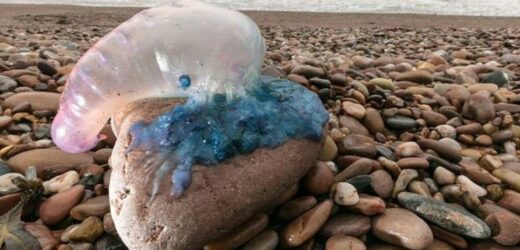Portuguese Man O’War jellyfish has sting that could kill a human
We use your sign-up to provide content in ways you’ve consented to and to improve our understanding of you. This may include adverts from us and 3rd parties based on our understanding. You can unsubscribe at any time. More info
The colourful but deadly critters have been washing up along the shores “all over the North-West”, according to one conservation group. With stained glass-like skin and wavy frills on their top, the creatures look very alien-like in their appearance. But these are not extraterrestrial invaders here to take over Britain, but rather blue bottle jellyfish, which are more popularly known as the Portuguese Men O’ War.
The Portuguese Men O’ War are most commonly seen out in the Atlantic and Indian Ocean, though they are known to venture into British waters as well.
Properly known as the Physalia physalis, they are often mistaken for proper jellyfish when in fact, they are a species of closely related siphonophore.
Rather than being a single organism that drifts aimlessly on the waves, the Portuguese Man O’ War is a colony of genetically identical zooids – clones – that each serve various functions.
These include floating, feeding, capturing prey and reproduction.


Together, the zooids act as one being and are sometimes seen floating in groups of 1,000 or more.
According to the Fylde Sand Dunes Project, the siphonophores have been washing up on Britain’s shores, sparking an official warning from the group.
The Man O’ War’s tentacles are packed with so-called stinging nematocysts, which are tiny capsules packed with venomous barbed tubes.
These are powerful enough to paralyse or even kill small fish and crustaceans.
According to the US National Ocean Service, the sting is rarely deadly to people but can be incredibly painful and leave behind welts.
Portuguese man o' war washes up on Cornwall beach in 2017
But there have been cases of people having extreme, even lethal reactions to their sting.
It is imperative then, that anyone who sees a Portuguese Man O’ War washed up on a beach, keeps themselves, their children and their pets way clear.
One such Man O’ War was seen on the sandy beaches at St Anne’s, just south of Blackpool.
Fylde Sand Dunes tweeted: “Look at what’s washed up on the shore at St Anne’s.
“It’s not a jellyfish… it’s a Portuguese Man O’ War!


“This isn’t one animal, but a mass of smaller animals called zooids, which live together as a single floating colony.”
In a follow-up tweet, the group said: “After last week’s stormy weather, Portuguese Man O’ War’s have been spotted on beaches all over the North-West!
“If you do see one though, please don’t touch it!
“They have a painful sting which they use to catch fish, but their tentacles can still sting after they are dead!”
The Wildlife Trust has issued a similar warning early last month after the creatures were seen washed up on the shores of Wales and the South Coast.
Because of their gas-filled bladders, Men O’ War do not have much control over where the tides and winds take them.
This is why they will often wash up on beaches after big storms.
The creatures typically grow to be about 12 inches long and five inches wide.
Their tentacles, however, can extend for as much as 165 feet in length.
Source: Read Full Article


